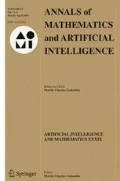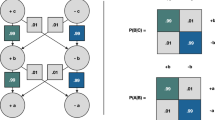Abstract
Sequent calculi for skeptical consequence in predicate default logic, predicate stable model logic programming, and infinite autoepistemic theories are presented and proved sound and complete. While skeptical consequence is decidable in the finite propositional case of all three formalisms, the move to predicate or infinite theories increases the complexity of skeptical reasoning to being Π 11 -complete. This implies the need for sequent rules with countably many premises, and such rules are employed.
Similar content being viewed by others
References
K.R. Apt, Introduction to logic programming, Technical Report TR-97-35, University of Texas (1987).
K.R. Apt, Logic programming, in: Handbook of Theoretical Computer Science, ed. J. van Leeuwen (MIT Press, Cambridge, MA, 1990) pp. 493–574.
S.N. Artemov, Explicit provability and constructive semantics, Bull. Symbolic Logic 7 (2001) 1–36.
J. Barwise, An introduction to first-order logic, in: Handbook of Mathematical Logic, ed. J. Barwise (North-Holland, Amsterdam, 1977) pp. 5–46.
P. Bonatti, A Gentzen system for non-theorems, Technical Report CD-TR 93/52, Christian Doppler Labor für Expertensysteme (1993).
P. Bonatti, Reasoning with infinite stable models, Artificial Intelligence (2004) 75–111.
P. Bonatti and N. Olivetti, Sequent calculi for propositional nonmonotonic logics, ACM Trans. Comput. Logic 3 (2002) 226–278.
D. Cenzer and J.B. Remmel, Π 01 classes in mathematics, in: Handbook of Recursive Mathematics, Vol. 2, eds. Y.L. Ershov, S.S. Goncharov, V.W. Marek, A. Nerode and J.B. Remmel (North-Holland, Amsterdam, 1998) pp. 623–821.
M. Gelfond and V. Lifschitz, The stable semantics for logic programs, in: Proceedings of the 5th Annual Symposium on Logic Programming, eds. R.A. Kowalski and K.A. Bowen (1988) pp. 1070–1080.
K. Konolige, Autoepistemic logic, in: Handbook of Logic in Artificial Intelligence and Logic Programming, Vol. 3, eds. D.M. Gabbay, C.J. Hogger and J.A. Robinson (Clarendon Press, Oxford, 1994) pp. 217–296.
V. Lifschitz, On open defaults, in: Computational Logic. Symposium Proceedings, ed. J.W. Lloyd (1990) pp. 80–95.
V. Lifschitz, Foundations of logic programming, in: Principles of Knowledge Representation, ed. G. Brewka (CSLI Publications, 1996) pp. 69–127.
J.W. Lloyd, Foundations of Logic Programming, 2nd edition (Springer, Berlin, 1987).
V.W. Marek, A. Nerode and J.B. Remmel, Nonmonotonic rule systems I, Ann. Math. Artificial Intelligence 1 (1990) 241–273.
V.W. Marek, A. Nerode and J.B. Remmel, The stable models of a predicate logic program, J. Logic Progr. 21 (1994) 129–154.
V.W. Marek and M. Truszczyński, Nonmonotonic Logic: Context-Dependent Reasoning (Springer, Berlin, 1993).
J. McCarthy, Circumscription – A form of nonmonotonic reasoning, Artificial Intelligence 13 (1980) 27–39.
D. McDermott and J. Doyle, Nonmonotonic logic I, Artificial Intelligence 13 (1980) 41–72.
R.S. Milnikel, Nonmonotonic logic: A monotonic approach, Ph.D. thesis, Cornell University (1999).
R.S. Milnikel, The complexity of predicate default logic over a countable domain, Ann. Pure Appl. Logic 120 (2003) 151–163.
R.S. Milnikel, A sequent calculus for skeptical reasoning in predicate default logic, in: Proceedings of the 7th European Conference for Symbolic and Quantitative Approaches to Reasoning with Uncertainty, eds. T.D. Nielsen and N.L. Zhang (2003) pp. 564–575.
R.S. Milnikel, A sequent caclulus for skeptical reasoning in autoepistemic logic, in: Proceedings of the 10th International Conference on Nonmonotonic Reasoning, eds. J. Delgrande and T. Schaub (2004).
G. Mints, Several formal systems of logic programming, Comput. Artif. Intell. 9 (1990) 19–41.
G. Mints, A complete calculus for pure prolog, Proc. Acad. Sci. Estonian SSR 35 (1996) 367–380. (In Russian.)
R.C. Moore, Possible-world semantics for the autoepistemic logic, in: Proceedings of the Workshop on Non-Monotonic Reasoning, ed. R. Reiter (1984) pp. 344–354.
R.C. Moore, Semantical considerations on non-monotonic logic, Artificial Intelligence 25 (1985) 75–94.
A. Nerode and R.A. Shore, Logic for Applications, 2nd edition (Springer, Berlin, 1997).
R. Reiter, A logic for default reasoning, Artificial Intelligence 13 (1980) 81–132.
J.S. Schlipf, Decidability and definability with circumscription, Ann. Pure Appl. Logic 35 (1987) 173–191.
Author information
Authors and Affiliations
Corresponding author
Additional information
AMS subject classification
03B42, 68N17, 68T27
This paper grew directly out of the author’s dissertation, written under the direction of Anil Nerode.
Rights and permissions
About this article
Cite this article
Milnikel, R.S. Sequent calculi for skeptical reasoning in predicate default logic and other nonmonotonic logics. Ann Math Artif Intell 44, 1–34 (2005). https://doi.org/10.1007/s10472-005-1808-3
Issue Date:
DOI: https://doi.org/10.1007/s10472-005-1808-3




